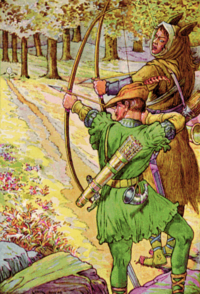Henchman

A henchman is a loyal employee, supporter, or aide to some powerful figure engaged in nefarious or criminal enterprises. A henchman is typically relatively unimportant in the organization, a minion, whose value lies primarily in their unquestioning loyalty to their leader. The term henchman is often used derisively (even comically) to refer to an individual of low status who lacks any moral compass of their own.
The term henchman originally referred to one who attended a horse for his employer, that is, a horse groom. Hence, like constable and marshal, also originally stable staff, henchman became the title of a subordinate official in a royal court or noble household.
Etymology
The first part of the word, which is recorded in English since 1360, comes from the Old English hengest, meaning "horse", notably stallion, cognates of which also occur in many Germanic languages, such as Old Frisian, German, Dutch hengst and Afrikaans hings [həŋs]. The word appears in the name of Hengest, the Saxon chieftain, and still survives in English in placenames and other names beginning with Hingst- or Hinx-. It was often rendered as Henxman in medieval English.
Young henchmen, in fact pages of honour or squires, rode or walked at the side of their master in processions and the like, and appear in the English royal household from the 14th century until Tudor Queen Elizabeth I abolished the royal henchmen, known also as the children of honour.
The word became obsolete for grooms in English from the middle of the 17th century, but was retained in Scots as "personal attendant of a Highland chief". It was revived in English by way of the novelist Sir Walter Scott, who took the word and its derivation, according to the New English Dictionary, from Edward Burt's Letters from a Gentleman in the North of Scotland, together with its erroneous derivation from haunch. The word is, in this sense, synonymous with wikt:gillie, the faithful personal follower of a Highland chieftain, the man who stands at his master's haunch, ready for any emergency.
The modern sense of "obedient or unscrupulous follower" is first recorded 1839, probably based on a misunderstanding of the word as used by Scott, and is often used to describe an out-and-out adherent or partisan, ready to do anything.
Modern examples
The phrase henchman is also used as a pejorative for any sort of political underling or to present others as such. Thus it was used for associates of President George W. Bush,[1][2] e.g. by Venezuelan President Hugo Chávez.[3] Likewise, it was also used against associates of the former U.S. President Bill Clinton.[4] Rebekah Brooks has been described as the henchwoman of Rupert Murdoch.[5]
Members of the SS, or any of Adolf Hitler's staff, are often called "Hitler's Henchmen",[6] a phrase used as the title of a book by Guido Knopp and a television documentary.
In popular culture
Henchmen are common in mystery, fantasy, and adventure novels, comic books, and movies. They are the expendable adherents of the main villain, always there to do the master's bidding, to kill or be killed, kidnap, or threaten, as needed. Often, they are killed by the hero before the master villain is reached, by the hero's sidekick in a dramatic battle, or even by the master villain as punishment for failure to comply with orders. In these cases they are often akin to minions and henchmen are sometimes called lackeys, toadies, or mooks. A female accomplice is more often called a "moll."
They may switch sides during the course of the story to ally with the hero. Alternatively, they may be forgotten in the heat of the climax when the master villain is defeated, then killed when they reappear in the denouement for one last scare or even promoted to master villain for a sequel.
Not all henchmen are dimwitted, expendable employees of a villain. Sometimes, they may be of an equal social standing or at least have a high intelligence or social standing of their own, thus being valued more like a right-hand man. In such cases, they may command groups of more expendable thugs.
A henchman might also be the non-player character follower of a player character in role-playing games. This henchman will follow the player around and assist in various manners.
Heroic supporting characters, tied to the hero by bonds of friendship and loyalty, are usually called sidekicks; the villain's supporters are called henchmen or minions because of their evil nature, which implies that such personal bonds are difficult to establish. However, some darkly comedic heroes have sidekicks of a more subservient nature; though these relationships are often a form of "tough love" or even just a condescending affection.
See also
References
Notes
- ^ ZNet |Labor | Bush's "Job-friendly" Economy isn't Worker Friendly Archived 2007-05-06 at the Wayback Machine
- ^ Kaplan, Fred (2004-05-14). "Quit blaming your henchmen, Mr. President. - By Fred Kaplan - Slate Magazine". Slate.com. Retrieved 2014-05-22.
- ^ http://www.politicalgateway.com/news/read/39515
- ^ "In denial - Clinton evades public blame for sex scandal - Capital Scene - Brief Article – National Review – Find Articles at BNET.com". [dead link]
- ^ "Bombastic butlers and a £150,000 question". New Statesman. 2011-03-03. Retrieved 2014-05-22.
- ^ "Hitler's Henchmen". Shoah.dk. Retrieved 2014-05-22.
Sources
- EtymologyOnLine
- This article incorporates text from a publication now in the public domain: Chisholm, Hugh, ed. (1911). "Henchman". Encyclopædia Britannica. Vol. 13 (11th ed.). Cambridge University Press. p. 266.
